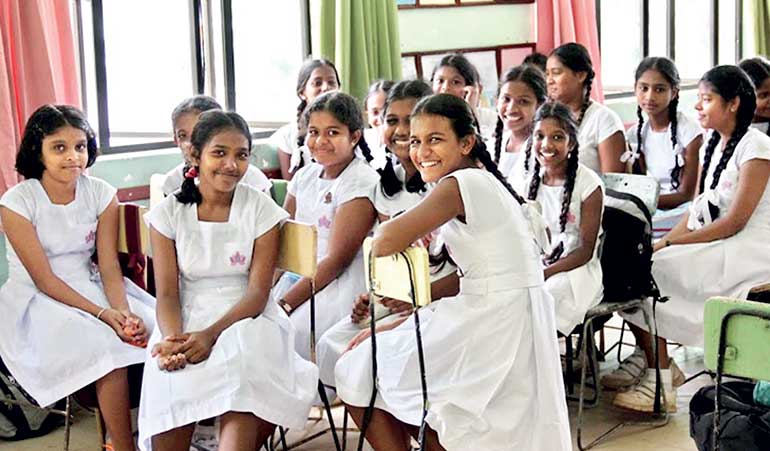The lowly or the wise are not outside but within us. This we do with our six touch-agencies of the eye, ear, tongue, nose, body and mind. Those associating with and developing the right things are the wise while those associating with wrong things are the foolish. Thus it is clear that even if one is highly educated yet does the wrong with the six touch-agencies then such a person is not wise. Today the youth who enter into employment after different levels of qualifications from the GCE O Level, A Level or university degrees seem to have a lack of empathy and understanding. Within a few months of employment, they want high increments and promotions even if they have not grasped the content of their work.
This is not due to their fault but the faulty education process where children were put through great misery at a young age, causing an absence of understanding. At a recent discussion on one of the Buddhist TV channels, a university professor said that some university students after finishing their education, before leaving residential halls, break room locks, commodes and many other things. Young lecturers after finishing the morning lecture do not switch off the lecture hall lights or fans, resulting in the wastage of electricity.
All these things exist today due to the failure of our early education system, especially during the Grade Five Scholarship process and tuition from as young as four to five years of age. Education does not make one wise or foolish. If that is the case, then Chula Panthaka Thero, who could not even commit to memory one stanza for three months, would not have become an Arahath Maha Thero. On the other hand, Bhikku Potila, who knew all three texts - Sutra, Abhidhamma and Vinaya - and who gave guidance to Bhikkus in meditation and had many Arahath Bhikku students, one day went to the Jethavana Viharaya. Seeing him the Enlightened One said: “So you came Thuchcha Potila (meaning Empty Potila).” The Enlightened One said so because Bhikku Potila was not walking the path to Nirvana but helping others and thereby had built high self-conceit. But as per present day acceptance, Bhikku Potila should have been addressed as Wise Potila.
Meditation
The authorities surely must be aware of the difficulties in changing the current education system that leads to tuition pressure on children. To alleviate the stress on children, the only solution is meditation in schools.
At least for two hours a week children should have mindfulness meditation. In this aspect the program implemented by Ven. Udairiyagama Dhammajeeva Thero in meditation known as Sathi Pasala is most laudable.
At the recently concluded Sathi Pasala Global Conference, a speaker from the UK told the gathering how the ministers and members of parliament in the UK engage in meditation at Westminster regularly. Further, a professor from a Sri Lankan university in his presentation spoke of the high stress factor with undergraduates and how they strike for the slightest reason. This is the symptom and the cause was the stress developed early in their life with education.
Already many schools are participating in this program. The authorities must implement this as soon as possible. With mindfulness developed, children will find it easier to cope with undue external stress. Recently while at the Vocational Training Institute to attend a meeting, I met a Bhikku who told me that one boy of about

12 years of age comes to his temple every day in the evening and after sweeping the lawn will offer flowers to Buddha and meditate for a while. He never went for tuition and in the 2017 Grade Five Scholarship had obtained over 180 marks. He now wants the Bhikku to help him because the parents are urging him to apply to top-ranked schools. The boy has told the Bhikku how can I come to temple every day if I go to these faraway schools?
So it is mindfulness and not tuition which is the need of the hour. Powered by mindfulness, children can easily comprehend it all at school and not focus too much on tuition, creating lots of space for their development of loving kindness, compassion, altruistic joy and equanimity, the greatest need of society today.
These days the Police and the presidential taskforce on drugs are doing a lot to prevent drug addiction among our citizens. The presidential taskforce slogan is ‘A country free of Intoxicants’. Yet if one were to walk past a liquor shop in the evening or a liquor shop at a supermarket, one can see many people thronging it to buy liquor.
Then the second danger is the exposure of our children to the machinations of drug pedlars. Today children are so stressed by the education system that they are easy prey to these unscrupulous people.
The third danger is smart technology, mainly the smartphone which today is used for cyber bullying. Children also spend too much time surfing useless things and also waste time on frivolous talk. The way to prevent these intoxicants reaching our children is not by treating the symptoms but the cause. Supposing a farmer going to the paddy field finds water draining away from the field through the sluice gate, he will not try to stop it from the farther end but block the entrance to the sluice. In the same way to prevent drug pedlars and liquor-makers from encroaching on our lives, the way forward is meditation.
Treating the cause is also the core basis of Co-Dependent Arising or Patichcha Samuppada. When there is a cause, there is an effect. If the cause is not there, then the effect does not arise. So the authorities, particularly at the presidential taskforce, must see that the way to prevent taking to intoxicants is by removing the cause, the mental stress at the child level.
The solution that must be applied from childhood through all ages is Mindfulness, Meditation and Vipassana Meditation (more can be found from these TIME Magazine articles http://time.com/1556/the-mindful-revolution/, http://time.com/4108442/mindfulness-meditation-pain-management).
It would appear that the whole world is going in the wrong direction. On 14 February, a 19-year-old schoolboy walked into his former school from where he was expelled and shot at fellow students, killing 17 students and adults. Meditation and nothing else is the only solution.
Yogā ve jāyatī bhūri, ayogā bhūrisaṅkhayo. Etaṃ dvedhā pathaṃ ñatvā bhavāya vibhavāya ca, tath’ āttānaṃ niveseyya yathā bhūri pavaḍḍhati (Verily, wisdom arises from meditation; without meditation wisdom wanes. Having known these two paths of progress and decline, let one so conduct oneself that one›s wisdom may increase (Dhammapada 20.282)).

 12 years of age comes to his temple every day in the evening and after sweeping the lawn will offer flowers to Buddha and meditate for a while. He never went for tuition and in the 2017 Grade Five Scholarship had obtained over 180 marks. He now wants the Bhikku to help him because the parents are urging him to apply to top-ranked schools. The boy has told the Bhikku how can I come to temple every day if I go to these faraway schools?
12 years of age comes to his temple every day in the evening and after sweeping the lawn will offer flowers to Buddha and meditate for a while. He never went for tuition and in the 2017 Grade Five Scholarship had obtained over 180 marks. He now wants the Bhikku to help him because the parents are urging him to apply to top-ranked schools. The boy has told the Bhikku how can I come to temple every day if I go to these faraway schools?